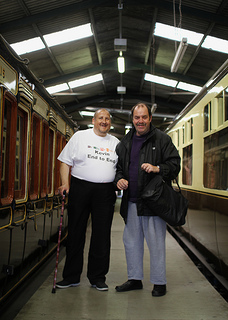
Public transport – by definition involves “buses, trains, and other forms of transport that are available to the public, charge set fares, and run on fixed routes”. While the network is meant to be for the use of the general public, a significant section of that population – people with a learning disability – faces challenges when using the system.
While people with a physical disability are often literally unable to get onto vehicles, someone with a learning disability might be physically capable of stepping onto a train, but might find the system as a whole impossible to negotiate.
My sister, for example, likes using buses, trains or Tubes but it would be impossible for her to safely work her way round any of those modes of transport alone; her anxiety would leave her rooted to the spot and she’d be unable to cope with making sense of the numerous changes and confusing timetables..multiple folded leaflets, tiny print, lots of abbreviations..forget it, it’s difficult enough for the rest of us, let alone someone with Fragile X syndrome. So her journeys are accompanied or she’s driven from A to B by us but for other people with learning disabilities, there are not many other options for getting about.
Take Kevin Preen, without public transport, he says he would be “stuck in doors all day”. Kevin, 52, has a learning disability and Perthes’ disease, which led to a hip replacement when he was seven-years-old.
Kevin is supported by and is a peer-advocate for Oxford-based learning disability charity My Life My Choice (he has also represented Oxfordshire’s learning disabled community at the National Forum). He is now spearheading a travel and transport campaign for My Life My Choice during Learning Disability Week, which starts today.
The 52-year-old, who is currently awaiting an Atos assessment for work capacity, adds”: “Without public transport…I could make a few short journeys a week by taxi but I couldn’t afford to do much.”
His awareness-raising mission, known as the End to End trip, involves Kevin and a fellow peer advocate, Michael Edwards, travelling by train from John O’Groats to Lands End to highlight the importance of public transport to learning disabled people amid the cuts.The social exclusion often faced by people with learning disabilities is being exacerbated by the cuts as day services close and public transport becomes even more important in boosting people’s independence.

Kevin adds: “It will be a new experience. I’m getting excited about meeting people on the train and raising awareness of how important public transport is to people with learning disabilities”
Kevin and his fellow “transport champion” Michael will stay in B&B’s and hotels along the route with travel passes issued by train firm First Great Western. Accompanied by the charity’s champions coordinator Dan Harris – who will be capturing their journey online – the aim is to record the good and bad aspects of the trip. Dan adds that even if the experience involves getting on the wrong train, “as long as it isn’t going to seriously impact our journey, it would be good to capture that and explore the challenges that led to the mistake”.
Michael, 59, who has very limited vision, epilepsy and a learning disability. He lives with his brother who acts as his carer. Michael helped found the self-help charity and is a trustee of My Life My Choice. He says: “Trains bring me a lot of pleasure. I have been planning my own routes and taking trips as far away as Devon for 15 years. I’ve been watching trains on platforms since 1967…I like trains, I’ve got myself a hobby.”
According to the charity, among the main travel issues faced by the people it supports is the difficulty in being unable to understand timetables and dealing with confusing platform changes. Kevin, for example, once ended up getting on a train heading for Penzance instead of his home area of Oxford because of making a wrong platform change. Another major problem is that of bullying on public transport.
Bus and train drivers are also not always aware of the needs of disabled passengers. Just last month, for example, Jackie, who is also supported by My Life My Choice was travelling independently on a bus. On boarding, the driver asked her to reverse her wheel chair into the disabled space, but didn’t give her time to reverse before moving off. The jolt as he pulled away meant Jackie’s jacket got caught and tore. She pressed the bell well in advance of her stop but the bus driver didn’t stop until she was past where she wanted to get off (he told her she hadn’t pressed the bell well enough in advance).
The End to End trip schedule takes in Glasgow, Manchester, Swansea and Paddington before arriving in Land’s End on Sunday August 25th. In each place, the travel champions will meet local learning disability organisations.
My Life My Choice hopes to publish an easy read document about learning disability and public transport as a result of the End to End campaign and you can follow the trip on Twitter.
* More information about the trip can be found on the charity’s website and you can view a gallery of photographs about the trip here here.
